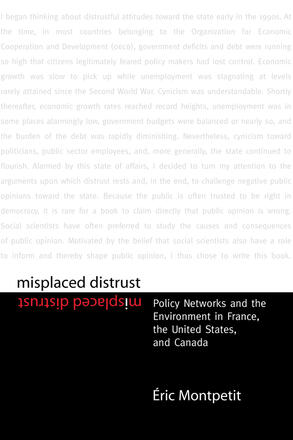
Misplaced Distrust
Policy Networks and the Environment in France, the United States, and Canada
A timely comparative study of state-network interactions in agro-environmental policy-making in the US, Canada, and France.
La description
Citizens of industrialized countries largely share a sense that national and international governance is inadequate, believing not only that public authorities are incapable of making the right policy decisions, but also that the entire network of state and civil society actors responsible for the discussion, negotiation, and implementation of policy choices is untrustworthy. Using agro-environmental policy development in France, the United States, and Canada as case studies, Éric Montpetit sets out to investigate the validity of this distrust through careful attention to the performance of the relevant policy networks. He concludes that distrust in policy networks is, for the most part, misplaced because high levels of performance by policy networks are more common than many political analysts and citizens expect.
Récompenses
- Winner, Lynton Keith Caldwell Prize, American Political Science STEP Award 2006
- Short-listed, Donner Prize, Donner Foundation 2004
Reviews
This book is a welcome addition to the environmental policy literature, primarily because it addresses an important gap in our understanding of the relationship among agricultural practices, environmental protection, and public policy. Misplaced Distrust contains a valuable discussion of how France, the United States, and Canada have developed policies to control the negative impacts of agricultural practices on the ecosystem. Perhaps this investigation will inspire other political scientists to conduct additional comparative research in this important policy area.
- Sheldon Kamieniecki, University of Southern California